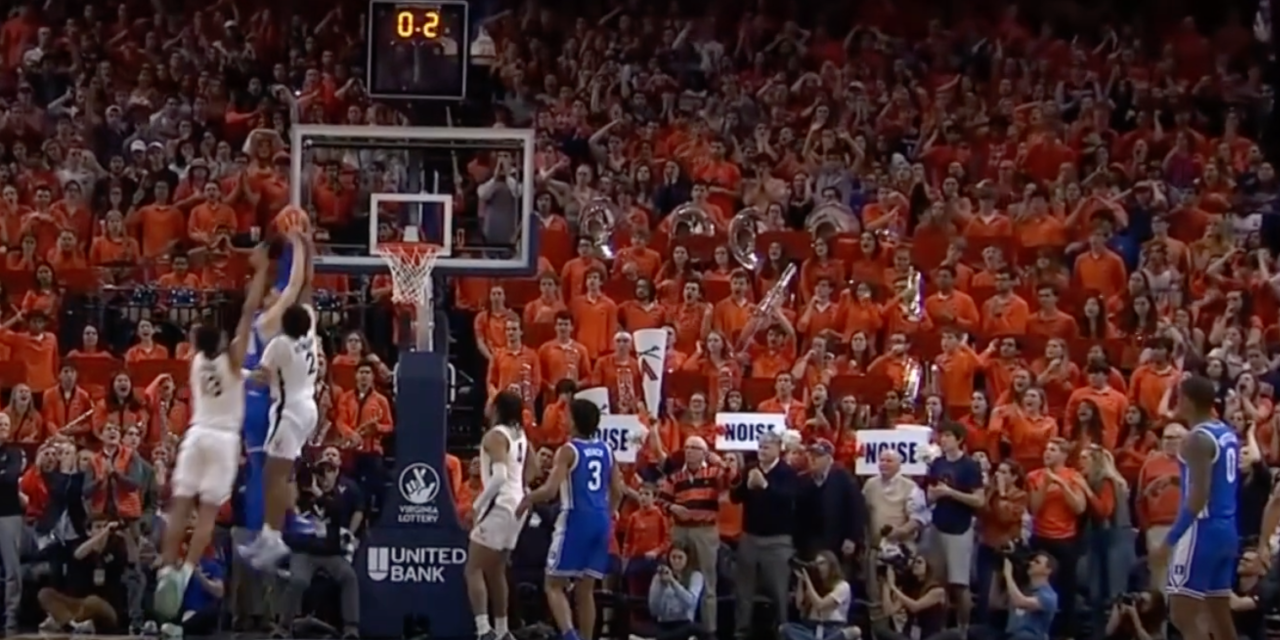On Sunday, Feb. 12, sports fans were of course talking about the Super Bowl.
However, in Atlantic Coast Conference (ACC) states, much of the buzz was about the no call – or rather the reversal of a call made on the floor – that snatched near certain victory away from the Duke University men’s basketball team and allowed Virginia to win the game in overtime.
It would have been a key win for the Blue Devils in the eyes of the NCAA Selection Committee because it would have been a road win against the 8th-ranked team in the country.
The controversial series of events happened during the final seconds of the game on Saturday, Feb. 11, which was tied at the end of regulation with 1.2 seconds left. Duke threw the ball in from out of bounds and a perfectly designed play allowed Duke’s Kyle Filipowski to go up for a layup before the clock expired. The layup did not go in but Filipowski was fouled with time left on the clock and a ref called the foul. At that point it looked like Duke would win because Filipowski would be at the line and have two shots to win the game with no time left on the clock.
Filipowski hits 76 percent of his free throws so a Duke victory seemed near certain.
However, after a review of the play and a lot of discussion, the refs inexplicably waved off the foul, which sent the game into overtime and allowed Virginia to win.
In the post-game interviews, Virginia’s coach said he wasn’t sure what had happened at the end of regulation, and Duke Coach Jon Scheyer stated he hoped to get clarity on why the foul call was waived off.
He did get some clarity later, which was cold comfort: The ACC put out a press release stating that the refs blew it.
The “ACC Statement on Duke at Virginia Men’s Basketball Final Play of Regulation” reads, “The Atlantic Coast Conference, upon review of the final play of regulation during the Duke at Virginia men’s basketball game, has announced an incorrect adjudication of the playing rules.”
The press release went on to note that a foul was called on Virginia’s Ryan Dunn as time expired.
“Upon the officials’ review of the play, it was determined that the foul committed occurred after the clock reached 0.0. However, the play should have resulted in two free throws for Duke.”
The foul actually appeared to occur before the clock expired, however, either way, Duke should have been granted the free throws according to the rules.
The league’s statement pointed to the rule that wasn’t adhered to: “Per Rule 5, Section 7, Article 3c of the NCAA Rule Book, while a foul occurred after expiration of play, the ball was still in flight, thus the student-athlete should have been granted two free throw attempts.”
The wording of that rule is as follows: “When a foul occurs so near the expiration of time that the official timer cannot stop the game clock before time expires or when the foul occurs after time expires but while the ball is in flight during a try, the period shall end when the free throw(s) and all related activity have been completed.”
Apologies are always nice to get – however, Scheyer was still disturbed by the on Monday, Feb.13.
“I‘m angry still,” Scheyer stated to the press. “I’d be lying to you if I said I wasn’t. Saturday was a disappointing outcome. All of us saw the ACC release. I respect them for pointing it out. I respect them for acknowledging it. Obviously [it] doesn’t change the outcome that our guys didn’t get the opportunity to earn a win.”
He said that he understands that officials get judgement calls wrong but that this was a matter of getting a rule wrong.
“You can’t get a rule wrong like that,” Scheyer said.


Get over it Scott. They are due some bad calls after 30 years of foul mouth K intimidation of the refs.
Lol, you see those incorrect calls all the time if you are playing UNC.
I was a basketball official for 22 years. Two of my mentors cautioned me with one key statement: the game should be in the players hands. Never make a game ending call that turns a loser into a winner, or a winner into a loser. That echoed with me for several minutes following the reversal of a basic call at game’s end in Charlottesville.
I miss the K-Man.